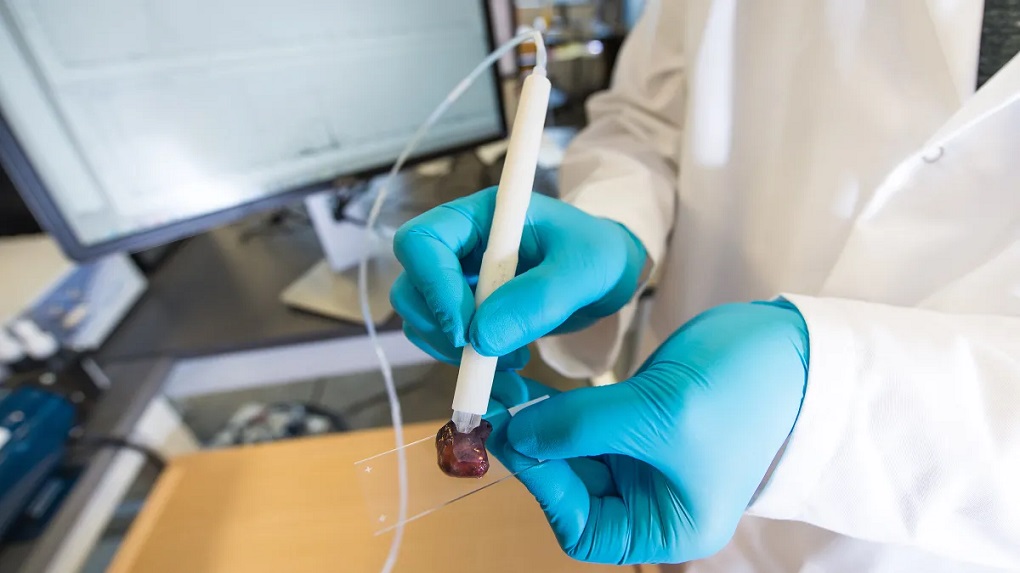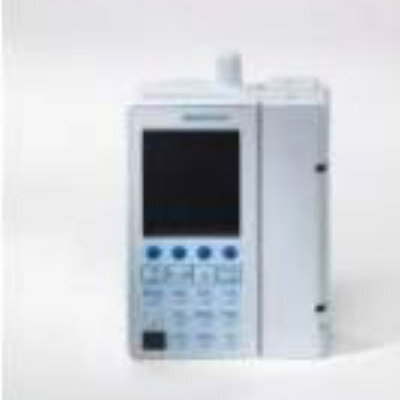Handheld Mass Spectrometry Device Detects Cancer by Touch 
|
By HospiMedica International staff writers Posted on 04 Aug 2023 |

The existing gold-standard method for diagnosing cancers and delineating the boundary between cancerous and healthy tissue during surgery, known as Frozen Section Analysis, is often slow and occasionally inaccurate. Each sample can take 30 minutes or more for preparation and interpretation by a pathologist, which increases the risk of patient infection and adverse impacts of anesthesia. Furthermore, for certain cancer types, frozen section interpretation can be challenging, leading to unreliable results in about 10 to 20% of cases. Now, a powerful tool rapidly and accurately identifies cancerous tissue during surgery, delivering results in roughly 10 seconds - a speed over 150 times faster than existing technology.
The MasSpec Pen from MS Pen Technologies (Houston, TX, USA) is an innovative handheld device that provides surgeons with precise diagnostic details regarding the specific tissue to be excised or preserved. This aids in enhancing treatment outcomes and minimizing the likelihood of cancer recurrence. Each cancer variant produces a distinctive set of metabolites and other biomarkers that serve as identifiers. The MasSpec Pen extracts and analyzes these metabolites to establish a molecular fingerprint of the tissue. Remarkably, this simple and gentle chemical process enables the MasSpec Pen to rapidly deliver diagnostic molecular data without causing any tissue damage.
The disposable handheld device is easy for physicians to operate. The process involves simply placing the pen against the patient's tissue, initiating the automated analysis via a foot pedal, and waiting a few seconds for the result. The pen releases a droplet of water onto the tissue, into which small molecules migrate. The device then propels the water sample into a mass spectrometer, an instrument that detects thousands of molecules to create a molecular fingerprint. A statistical classifier software instantaneously evaluates the molecular fingerprint obtained from an uncharacterized tissue sample by the MasSpec Pen, utilizing a database of molecular fingerprints collated from 253 human tissue samples. These samples comprised both normal and cancerous tissues from the breast, lung, thyroid, and ovary. Upon completion of the MasSpec Pen analysis, the terms "Normal" or "Cancer" automatically appear on a computer screen. For specific cancers, such as lung cancer, a subtype may also be indicated.
In trials involving tissues extracted from 253 human cancer patients, the MasSpec Pen was able to provide a diagnosis in about 10 seconds, with an accuracy exceeding 96%. The technology could also detect cancer in marginal regions between normal and cancer tissues, which exhibited mixed cellular composition. Additionally, the MasSpec Pen demonstrated its ability to accurately diagnose cancer in live mice with tumors during surgery, without causing any noticeable tissue damage or stress to the animals. The MasSpec Pen shows potential for application as a clinical and intra-operative tool for both ex-vivo and in-vivo cancer diagnosis, and was a finalist for the 2023 AACC Disruptive Technology Award.
Related Links:
MS Pen Technologies
Latest Surgical Techniques News
- Bioprinted Aortas Offer New Hope for Vascular Repair
- Early TAVR Intervention Reduces Cardiovascular Events in Asymptomatic Aortic Stenosis Patients
- New Procedure Found Safe and Effective for Patients Undergoing Transcatheter Mitral Valve Replacement
- No-Touch Vein Harvesting Reduces Graft Failure Risk for Heart Bypass Patients
- DNA Origami Improves Imaging of Dense Pancreatic Tissue for Cancer Detection and Treatment
- Pioneering Sutureless Coronary Bypass Technology to Eliminate Open-Chest Procedures
- Intravascular Imaging for Guiding Stent Implantation Ensures Safer Stenting Procedures
- World's First AI Surgical Guidance Platform Allows Surgeons to Measure Success in Real-Time
- AI-Generated Synthetic Scarred Hearts Aid Atrial Fibrillation Treatment
- New Class of Bioadhesives to Connect Human Tissues to Long-Term Medical Implants
- New Transcatheter Valve Found Safe and Effective for Treating Aortic Regurgitation
- Minimally Invasive Valve Repair Reduces Hospitalizations in Severe Tricuspid Regurgitation Patients
- Tiny Robotic Tools Powered by Magnetic Fields to Enable Minimally Invasive Brain Surgery
- Magnetic Tweezers Make Robotic Surgery Safer and More Precise
- AI-Powered Surgical Planning Tool Improves Pre-Op Planning
- Novel Sensing System Restores Missing Sense of Touch in Minimally Invasive Surgery
Channels
Critical Care
view channel
Mechanosensing-Based Approach Offers Promising Strategy to Treat Cardiovascular Fibrosis
Cardiac fibrosis, which involves the stiffening and scarring of heart tissue, is a fundamental feature of nearly every type of heart disease, from acute ischemic injuries to genetic cardiomyopathies.... Read more
AI Interpretability Tool for Photographed ECG Images Offers Pixel-Level Precision
The electrocardiogram (ECG) is a crucial diagnostic tool in modern medicine, used to detect heart conditions such as arrhythmias and structural abnormalities. Every year, millions of ECGs are performed... Read morePatient Care
view channel
Portable Biosensor Platform to Reduce Hospital-Acquired Infections
Approximately 4 million patients in the European Union acquire healthcare-associated infections (HAIs) or nosocomial infections each year, with around 37,000 deaths directly resulting from these infections,... Read moreFirst-Of-Its-Kind Portable Germicidal Light Technology Disinfects High-Touch Clinical Surfaces in Seconds
Reducing healthcare-acquired infections (HAIs) remains a pressing issue within global healthcare systems. In the United States alone, 1.7 million patients contract HAIs annually, leading to approximately... Read more
Surgical Capacity Optimization Solution Helps Hospitals Boost OR Utilization
An innovative solution has the capability to transform surgical capacity utilization by targeting the root cause of surgical block time inefficiencies. Fujitsu Limited’s (Tokyo, Japan) Surgical Capacity... Read more
Game-Changing Innovation in Surgical Instrument Sterilization Significantly Improves OR Throughput
A groundbreaking innovation enables hospitals to significantly improve instrument processing time and throughput in operating rooms (ORs) and sterile processing departments. Turbett Surgical, Inc.... Read moreHealth IT
view channel
Printable Molecule-Selective Nanoparticles Enable Mass Production of Wearable Biosensors
The future of medicine is likely to focus on the personalization of healthcare—understanding exactly what an individual requires and delivering the appropriate combination of nutrients, metabolites, and... Read more
Smartwatches Could Detect Congestive Heart Failure
Diagnosing congestive heart failure (CHF) typically requires expensive and time-consuming imaging techniques like echocardiography, also known as cardiac ultrasound. Previously, detecting CHF by analyzing... Read moreBusiness
view channel
Expanded Collaboration to Transform OR Technology Through AI and Automation
The expansion of an existing collaboration between three leading companies aims to develop artificial intelligence (AI)-driven solutions for smart operating rooms with sophisticated monitoring and automation.... Read more

















